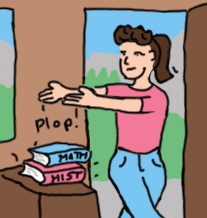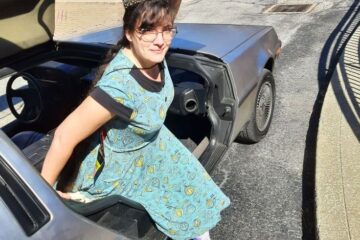I wrote this blog post shortly after returning from the Clarion Workshop, in August, 2013. A friend is collecting blog posts about Clarion, and that made me seek it out on my old Livejournal. I’m moving it here for her to link, and also to remind myself of that breathless joy I felt back then. It’s important to remember the good times!
“How long were you gone? Two weeks? Four? SIX? Wow. Was it worth it?” Well-meaning co-workers ask with wide eyes.
“Gee, good to know I was missed,” I joke, and then say, “Yes. It was worth it. It was life-changing.”
Before I applied to Clarion, my writer-friends often said, “It’ll change your life.” I could see how an intensive workshopping experience would improve my craftmanship, would be enjoyable and challenging, but I didn’t see how it would change my life. Until now.
It’s not just writing. It’s who you are. Exploring the stories we tell explores who we are in an intense way. I learned a lot about myself.
I always knew I was insecure, but GEEESH am I insecure!! After my initial crying jags because I thought the other students didn’t like me came the crying jags because I thought the other students were better writers than me. There was no hiding – not in close quarters with seventeen people with great insight into character. The instructors told me the hard truths. I wasn’t good enough, yet. I needed to expose all that weird inside me or my writing would be “just surface”.
My instructors and cohort were the best psychiatrists money could buy. I’m not joking. Through the crucible of struggling with my art, I burned off the pus of my emotional wounds.
I feel raw and clean now, like coming fresh from a day at the beach.
It wasn’t about learning some new ‘trick’ or technique. I learned tricks and techniques. I heard a lot of stuff I’d heard in writing classes and workshops before. Good stuff. Clarion wasn’t about just that – it dug under the surface of words. It wasn’t any one moment or lecture. It was the constant worrying at the problem of Story. Day after day, week after week of asking “What would make this story better?” couldn’t help but expose the roots, to ask, “What makes this a story?” and even, “Why do we write at all?”
I still preferred the same sentence structures, still had the same favorite character types and tropes. My sentences didn’t change. The surface – the words – are just bricks. The structure underneath – the joists and beams that had before been erected at random, shored up as needed – I could now see and adjust so they stood on their own.
The heart of the matter – the deep brain-meats. That’s what Clarion exposes, and why it’s so hard to explain what, exactly, I “got” for my time and money. I got changed.

